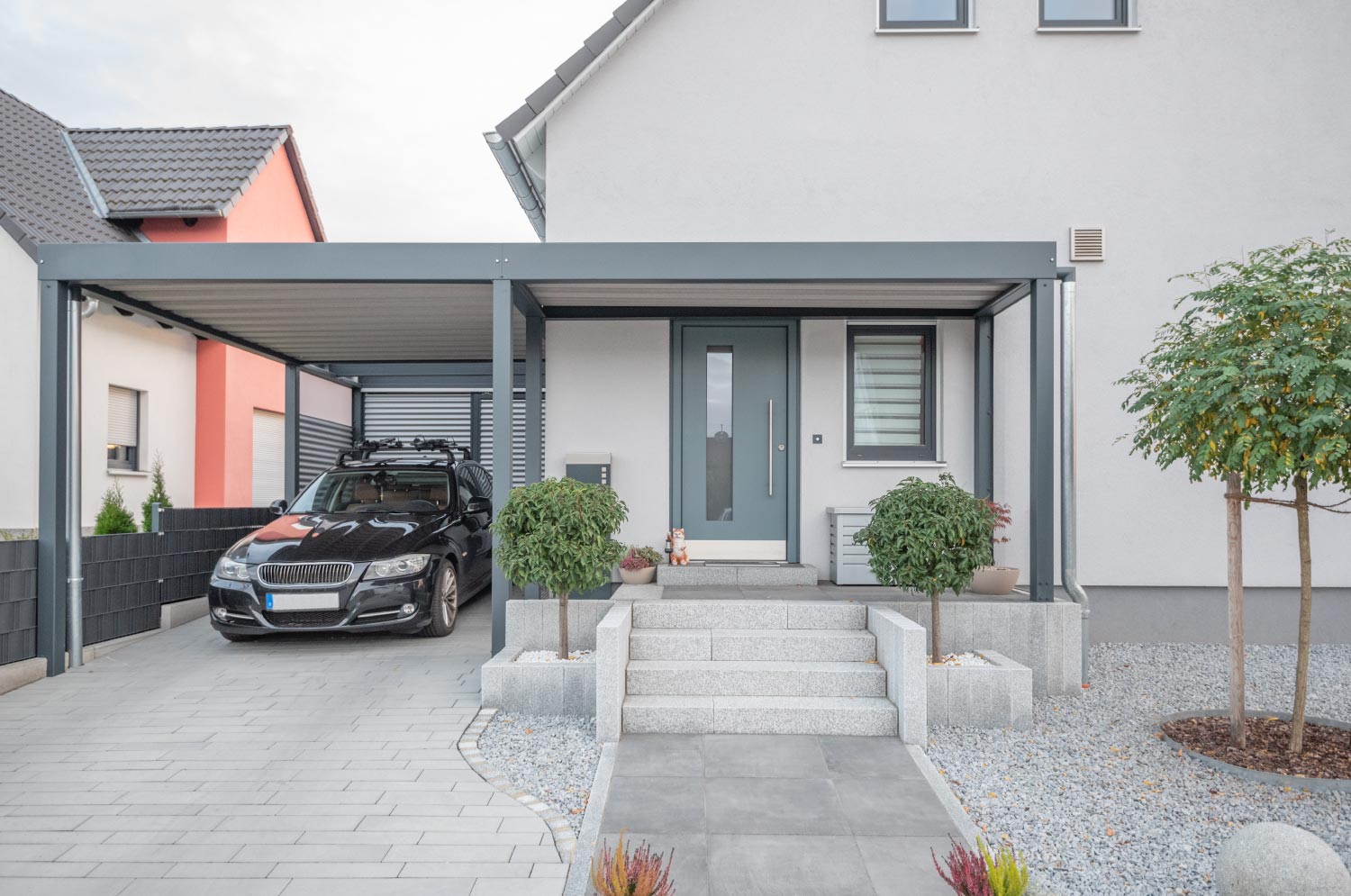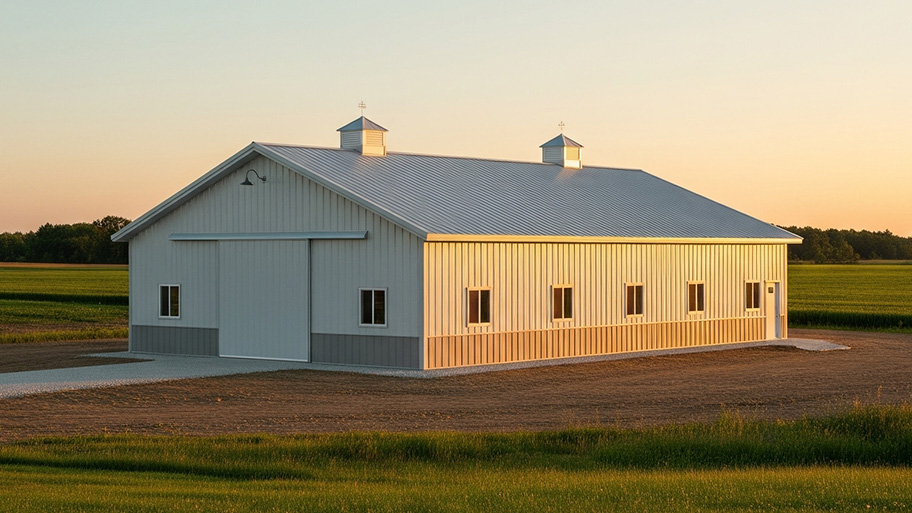
The cost to build a shed depends on factors like size, material, type, and more. Learn how much it’ll cost to hire someone to build your new shed.
Your car deserves a cozy nook of its own


Carports cover your vehicle and protect it from rain, snow, and UV light.
A carport costs $3,600 on average, or between $2,100 and $5,100.
Garages provide better protection, but they’re also much more expensive.
Some carports are prebuilt, so you can install them quickly and often without permits.
When you don’t have the budget to build a garage—or it’s filled to the brim with collectibles, sporting equipment, and storage boxes—consider investing in a carport to protect your vehicle from the elements instead of leaving it in long-term car storage.
Carports are a budget-friendly alternative to a garage. On average, a carport costs $3,600 but can range between $2,100 and $5,100 depending on the size and type. Carports offer many benefits, but is it the right choice for you and your home? We’ll answer that and more in this guide to carports.

So—what is a carport exactly? A carport is a type of outdoor covered structure that is open-sided and designed to shelter vehicles. They have a roof supported by posts or columns that offer protection from sun, rain, and snow. Unlike a garage, a carport lacks enclosed walls, providing easy access and ventilation. Carports are a cost-effective alternative to traditional garages that offer a simple and practical solution for sheltering vehicles.
Whether you prefer a carport for one or two vehicles, or one that’s freestanding or attached, there’s likely going to be one that suits your needs. Keep these several types in mind when considering your carport style ideas.
As the name suggests, single carports cover enough area to protect a single standard-sized automobile, often including light-duty trucks. Single carports can often fit anywhere on your property that a car would fit and are the least costly type of carport.
Wider carports that fit two cars side-by-side are double carports. This size of carport ranges from 20 feet by 20 feet to protect small passenger vehicles up to around 25 by 25 feet for standard-size and slightly larger cars and small trucks.
Like double carports, tandem units are large enough to cover two automobiles, with typical dimensions being the same width as a single carport but up to 36 feet long. Tandem carports feature parking spots that line up one in front of the other instead of side by side. These units are excellent for properties that are deeper than they are wide.
As its name implies, a freestanding carport supports itself without being attached to a home or garage structure. These carports are available in many sizes in single, double, and tandem styles. You can either have a permanent freestanding carport built or purchase a prebuilt freestanding carport for fast and easy installation.
Attached carports—also known as lean-tos—connect directly to the side or roof of a home or garage structure. The building structure creates a wall on one or more sides of the carport and supports part of the unit, while posts support the other sides.
Manufacturers make carports in a variety of materials and styles.
Regular: A regular-style, also known as barn-style, carport roof is characterized by a curved or rounded design with horizontal panels that resemble the shape of a traditional barn roof.
Flat roofs: These are just like they sound—flat—but they can be unsafe in heavy snow and heavy rain, which can weigh them down and damage the vehicle below
Boxed-eave: Boxed-eave carport roofs feature a design that resembles the A-frame style, with horizontal roof panels and a slight overhang.
Gable roof carports: Their triangular, sloped design makes them an attractive option, plus rain and snow trickle down the roof to the ground
Single-slope: A single-slope carport roof has a simple, slanted design, with one side higher than the other.
While carports can be constructed using various materials, the most common ones are metal, wood, and polycarbonate. Metal carports, often made from steel or aluminum, are durable, low-maintenance, and rust-resistant.
Wood carports offer a classic aesthetic and can be customized, but they may require more maintenance and can be susceptible to decay over time. Polycarbonate carports utilize translucent panels, providing natural light while protecting against UV rays; they are lightweight and resistant to impact.
Each material has distinct advantages, and homeowners can choose what works for them based on preferences for durability, aesthetics, and specific environmental conditions.
| Carport Pros | Carport Cons |
|---|---|
| More affordable to buy and build than garages | Doesn't provide convenient storage |
| Come in a variety of types and styles | Offers less protection for vehicles than a garage |
| Don’t need to comply with stringent building codes and city regulations | Doesn't provide added vehicle security against break-ins, theft, and vandalism |
| Protects your vehicle from rain, snow, UV light, and falling leaves and branches | Adds less to the home's value than a garage |
| Offers a covered space for your vehicle (or a second car) when your garage is full | Don’t include garage doors for convenience and security |
| Easier to install or build than a garage | Not as aesthetically pleasing as a garage |
| Can double as an outdoor dining and entertainment space | Not as durable against the elements as a garage |
From style and type to budget and ease of installation, carports offer a variety of advantages. However, there are some features you'll have to do without when choosing to build a carport instead of a garage.
Carports are a cost-effective alternative to traditional garages, both in terms of initial investment and ongoing construction expenses. A standard metal carport costs about $3,500, while a garage can exceed $25,000.
One of the significant advantages of carports is their versatility in types and styles. They come in various designs, ranging from open-sided structures to more enclosed options, providing flexibility to cater to individual preferences and specific needs. This adaptability ensures carports can seamlessly integrate into diverse architectural styles and landscapes.
Unlike garages, carports often avoid the complexities of stringent building codes and city regulations. This streamlined regulatory process makes obtaining approvals and permits more straightforward, which means a quicker project timeline.
Carports are also effective shields against environmental elements. From rain and snow to UV rays and falling leaves or branches, they provide a protective barrier that protects vehicles. When garages become filled with belongings like holiday decorations or tools, carports can offer an alternative covered space for cars.
Last, but certainly not least, carport construction is notably simpler compared to garages. The straightforward design and fewer structural components make the building process more accessible, allowing for quicker assembly. This ease of installation contributes to the overall convenience and efficiency of opting for a carport, especially for those seeking a swift and hassle-free solution for vehicle protection.
While carports offer various advantages, they also have drawbacks. For instance, if you need storage space, a carport won’t help you. Unlike garages, carports lack walls and security features, making them less suitable for storing valuables.
In terms of property value, carports add less to a home's overall worth compared to garages. The enclosed and secure nature of garages often contributes more significantly to the appraised value of a property, whereas carports are perceived as functional but less impactful in terms of real estate value.
Despite their protective capabilities against environmental elements, carports offer less reliable shelter than garages. Wind will have no problem making its way into your carport. Security concerns are also valid. Unlike garages equipped with doors and locks, carports lack the same level of security against break-ins, theft, and vandalism.
Deciding whether a carport is a good alternative to building a garage comes down to your budget and storage needs. Carports are significantly more affordable, even if you hire a carport builder near you for the installation. Besides the cost difference between the two, with carports costing significantly less than a garage, there are other factors to consider.
Regarding storage and security, garages are the clear winner in the carport vs. garage debate. While a carport protects your vehicle from rain, snow, and sunlight, it won’t protect it from vandalism or theft like a garage would. Plus, storing things other than your car under your carport roof offers virtually no security for loose items, and your storage will be visible from the outside. As such, you have to put less thought into organizing your garage than you would your carport storage.
Also, a garage complements the home's appearance since it can have siding and trim to match the main structure. While a carport may have some stigma as being an afterthought structure, that doesn't necessarily rule it out regarding looks. Attractive and durable carports are available in kit or custom forms that rival a garage's appearance factor. However, most homeowners still prefer the cohesive look of a garage over that of a carport.
While adding a carport won't add as much home value as installing a new garage, there is value in installing one. But your property value may only increase if the carport is in great shape. You'll also want to maintain it well to avoid a carport in bad shape being an eyesore when it comes time to sell the home. However, a well-maintained, high-quality carport can be an excellent selling point for your home, especially in locations where garages are less necessary to protect against extreme weather.
When you don't have the luxury of owning a garage, or you need space for a second car, hiring a pro to install a carport is an ideal money-saving garage alternative to protect your vehicle.
Dan Simms contributed to this piece.
From average costs to expert advice, get all the answers you need to get your job done.

The cost to build a shed depends on factors like size, material, type, and more. Learn how much it’ll cost to hire someone to build your new shed.

Considering enclosing your carport to turn it into a more protective garage? Find out about the cost to convert a carport into a garage in this handy guide.

Discover the cost to build a pole barn, including average prices, key cost factors, and tips to help you budget and plan your project with confidence.

Here’s a handy list of questions about building a garage you’ll need to answer for potential pros.

Looking for the right garage heater size for your space? Keep reading to learn how to choose the right size based on garage square footage.

If you need to build extra living space at your home, this guide on how to convert a garage into a bedroom shows you all the steps.